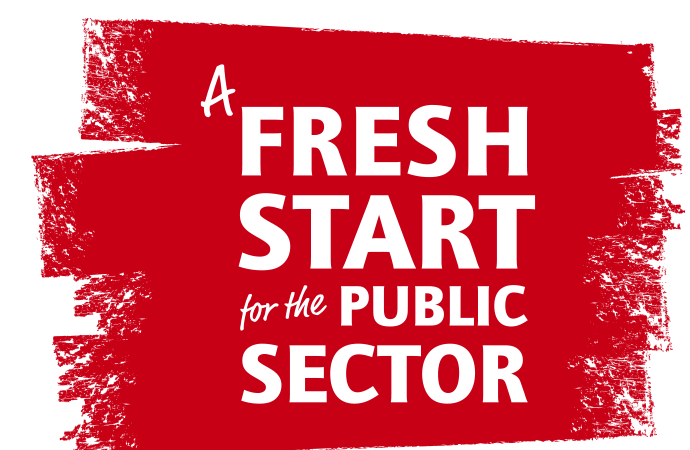NSW voters have had their say and turfed out a State
Government with an agenda of privatisation, wage restraint, environmental disregard and insecure labour. But for our union, the fight goes on.
The crowd’s roar was heard across Botany Bay. As electorates held by the Liberal Party (and one National seat) tumbled, the Labor Party election night function in the beach-side suburb of Brighton-le-Sands grew ever more raucous. As the ABC’s Antony Green switched between his flashy charts and talked percentages, swings and trends, it became obvious a new Premier would be grinning on the front pages of the Sunday tabloids.
Chris Minns was the state’s new leader.
In subsequent weeks, as close counts were finalised, the initial euphoria of the night wore off as it emerged that Mr Minns was to govern in minority, with a large crossbench in the Legislative Assembly committing to ensure his government was able to operate. In the state’s upper house, the Legislative Council, things were a bit tougher, with a 50-50 split between parties to the right and left.
For the PSA CPSU NSW, the result brought with it a sense of relief and optimism. While the union was not directly campaigning for Mr Minns, it had put in a herculean effort to alert voters to the dangers of another four years of government under Dominic Perrottet and the Liberal National Coalition.
“We proved to voters that not only did the agenda of sell-offs, wage cuts and insecure work hurt our members, it was also damaging the state,” said PSA CPSU NSW General Secretary Stewart Little. “Before the election, we contacted all MPs and parties asking their opinions on these matters. Labor and the Greens, who retained three seats, were as one with us, agreeing on all five points.
“With some exceptions on some issues, all minor parties and independents on the crossbenchers were receptive to our message and the needs of our members. Even some of the more conservative crossbenchers agreed that the previous government’s policies were bad for the state and were broadly supportive of our campaign agenda.
“Things are looking a whole lot better for at least the next four years.”
The PSA CPSU NSW campaigned on numerous issues. The success of this campaign will mean better wages and conditions for members, particularly those employed directly by the State Government.
Better Wages
“With the recent offer of a 4.5 per cent increase, we can finally wave goodbye to the wages cap,” said Mr Little. “The cap has limited our wage increases, usually to 2.5 per cent. In one case, Mr Perrottet tried to block a pay rise full stop. This effectively saw our wages go backwards, particularly in recent years when inflation has reached numbers not seen since the 1980s.
“When he was Opposition Leader, Mr Minns came to our conference last year and agreed the cap had to go. He was also responsive to similar messages from our colleagues in other public sector unions who, like us, were sick of seeing their members’ wage packets drop in real value.”
The PSA CPSU NSW’s Public Sector Needs a Pay Rise campaign neatly characterised the issue faced by so many members. In June 2022, the union’s members flooded the streets of Sydney and regional centres wearing white shirts displaying the simple, seven-word message: The Public Sector Needs a Pay Rise. There was no confusion here: the wages cap had to go.
“The wage cap was not only bad for our members, it was bad for the state,” said Mr Little. “It meant less money in the economy and reduced the incentive for talented staff members to remain working for NSW, particularly as wage increases in the private sector were so much more generous.
“Economics aside, it is a moral issue. Our members have done their bit during fires, floods and a pandemic. The wages cap was a slap in the face to the people who literally saved the state.”
The battle for better wages did not stop on election night. The state may have a new Premier at the helm, but he is still in charge of a team looking at outgoings. There is still a hostile press that will use any pay rise for the Public Sector as a subject for their next column of outrage fodder.
“Mr Minns was welcome to our conference, but he’s still the person we negotiate with,” said Mr Little. “We will be demanding he ignore the naysayers no doubt advising him to keep the cap in place.
“He must instead do the right thing and give our members a pay rise that undoes years of needless fiscal rectitude and ensures we are keeping up with the cost of living that is hurting us all.”
Public Jobs
Even among the bluest of conservative voters, privatisation has never been popular. Yet the Liberal National Coalition ignored voters and instead listened to its benefactors in the halls of industry, embarking on a frenzy of selling.
In its 12 years in power, the Coalition sold $92 billion of state assets, including a multitude of services affecting our members. Some of the sales, including the Land Titles Office, even enraged its most rusted-on supporters in the property industry.
This belligerence was a big factor in voter anger in March 2023. The free hand given to privatised power companies saw bills skyrocket, with rises not replicated in states such as Queensland that had not gone down the same path.
Bus services were sold off and became less frequent. Many routes were replaced by a privately operated light rail service that was ridiculed for cost overruns and delays in delivery that destroyed many businesses. The end result was a service that became infamous for its sluggish progress through the city.
In the state’s north, a shiny new prison outside Grafton drew scorn when it offered Prison Officers wages commensurate with hardware retail workers. This was despite the fact these workers had to deal with maximum-security inmates serving time for offences such as murder and rape. CPSU NSW members in another private gaol, Parklea (admittedly sold off by Labor) have become used to low numbers of Officers per inmate and have recently emerged from a protracted round of negotiations over wages and conditions with an employer determined to pay as little as possible.
In the case of disability services, the former government’s retreat from the sector has left some of the most vulnerable people in the state at the mercy of private operators. There is no government safety net for those who slip through this system.
“Privatisation has resulted in lower-quality services, higher prices and disgruntled employees,” said Mr Little. “It is obvious our members don’t like the cuts to wages, conditions and employment security. They don’t like having fewer colleagues in the workplace and they don’t like unhappy clients.
“But it is the public who turned on the former State Government and voted them out. Voters were told in the 2019 State election that the privatisation agenda was over, yet the sell-offs continued once the Liberal National Coalition was returned to power.”
While the Labor campaign was consistent in its message that privatisation was finished if Mr Minns won power, things were a lot messier on the Liberal Party side. Premier Dominic Perrottet was determined to convince voters his party had changed its stripes and his addiction to flogging off state assets had been cured.
However, his candidates were not singing from the same song sheet. North Shore MP Felicity Wilson stuck to the tired private-does-it-better mantra, while Riverstone candidate Mohit Kumar talked about his love of “asset recycling”, which was a term the Government attempted to use to put a positive spin on sell-offs.
But it was footage emerging from the state’s south that hardened voters’ resolve to punish the Coalition for its privatisation agenda. At a debate, Liberal candidates Wendy Tuckerman and Nathanial Smith held up placards indicating they supported the idea of privatising Sydney Water.
It later emerged the State Government had canvassed selling this vital asset. In the view of the Perrottet Government, the most important element for life itself was up for sale.
“We hate privatisation and voters hate privatisation,” said Mr Little. “We hope that, if anything, this has sent this misguided idea to a political grave and both sides of politics will not campaign on it in the future.
“However, we can not relax. If state finances tighten, the Treasurer will be getting advice from some quarters that a quick sugar hit from an asset sale will be just what is ordered. He needs to know that we will fight any more sell-offs regardless of who is in charge.”
The PSA CPSU NSW will also look at how to bring assets back into the public fold. This won’t be straightforward. After the election, it emerged that the Perrottet Government signed off on millions of dollars in bus contracts that will make it very difficult to return services to the state.
The contract to run Parklea Gaol will be up for renewal some time after 2025. The union is determined that Corrective Services NSW, the public operator, wins the contract to operate the prison.
 Secure Jobs
Secure Jobs
Under the previous government, NSW was hopelessly addicted to insecure work. In areas such as schools, more than half of all workers were employed year-to-year; sometimes for more than a decade. Workers employed in this manner were less likely to access loans and other financial services. Every year, they worried whether they would have a new insecure role to return to, or whether the guillotine would fall on their position, and they’d be cast onto the jobless pile.
The PSA CPSU NSW has long campaigned that excessive insecure work is also damaging for workplaces. Without a secure role, workers are less likely to report dangerous or abusive behaviour for fear of being labelled a troublemaker and not re-employed when roles are once again allocated.
Institutional knowledge walks out the door and training costs go up when an employee decides enough is enough and opts to work in a secure position in another field.
The PSA CPSU NSW has been pushing for years for this addiction to insecure labour to stop. And as it became an election issue, both the then Coalition Government and Labor Opposition took notice, vowing to convert thousands of temporary roles for school support staff and teachers into full-time, permanent jobs.
“This is the power of a union,” said Mr Little. “We went to both parties, stated what we needed from them and pointed out the status quo was not only bad for our members, but the public wasn’t too keen on it either.
“We got the assurances, which is fine, but the work is not done, and we will now be fighting to convert as many of our members in insecure roles into permanent positions. For them, their PSA CPSU NSW membership means a life-changing alteration to their working conditions.
“We know it, it is obvious voters know it; and we are heartened to see the Education Minister doing her bit moving on permanency for our members doing such amazing work in the state’s schools.”
In addition, the PSA CPSU NSW is auditing all employers covering its membership to find out how reliant these agencies and departments are on insecure work.
“We need to know where these insecure workers, including agency and temp employees, are and what is being done to give those eligible members who want one, a secure permanent role,” said Mr Little.
No more politics
For 12 years, the Public Sector was a convenient political football for the Liberal National Coalition to kick around. Wages and conditions had been set by the Industrial Relations Commission (IRC), but the wages cap took many of this body’s powers away from it. Instead, the Government, egged on by its media supporters, played the tough guy by restricting Public Sector wages and conditions.
“The PSA CPSU NSW has campaigned to return the powers to fix wages and conditions to an independent umpire, in this case the IRC,” said Mr Little. “When deciding your wages, the IRC will look at factors such as inflation and the value of your work. It will look at pay rises in similar sectors and it will arrive at its conclusions using evidence, not what they hope will impress the editor of the Daily Telegraph.”
The PSA CPSU NSW will obviously not stop campaigning for better rights, wages and conditions for members, but with the IRC at the helm, it is far more likely to be listened to.
No more GSE
The Government Sector Employment Act (GSE) replaced the more effective Public Sector Employment Act. The new act took away many worker rights, including protections of employees under investigation.
More importantly, the GSE is a neofuedal instrument that tied workers to the Public Sector rather than to the agency they worked in.
“We have received a commitment from the incoming Government that the GSE’s days are numbered,” said Mr Little. “Those crossbenchers with a good understanding of its nature are also on board.
“What needs to replace it is an act that acknowledges the hard work our members do for the people of NSW.”
A brighter future
“The election of the Labor Party ends a dozen years of pain for PSA CPSU NSW members,” said Mr Little. “The Government, working in tandem with a Labor administration in Canberra, can bring about public-led improvements for the state, brought about by our members in the Public Sector working hard for a better NSW.
“But Mr Minns and his cabinet need to know they cannot hide behind their political affiliations if they implement policies that go against the Public Sector. Our members proved last year they are willing to walk off the job and take to the streets to get what they want.
“They will do it again if required.”




















Leave a Comment
Your email address will not be published. Required fields are marked with *